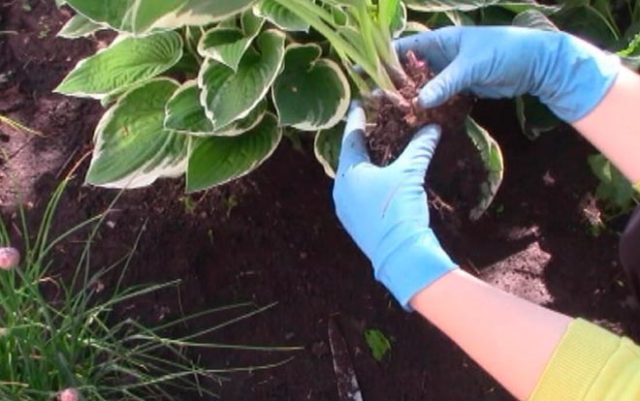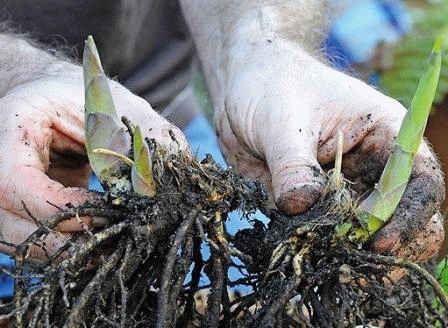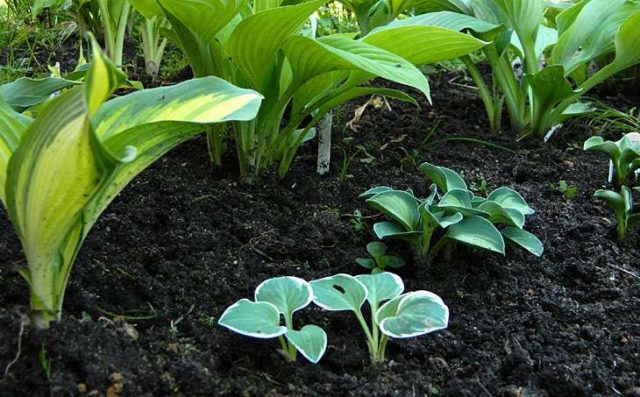Content
Many gardeners prefer to divide the hosta bush in the spring. Then the delenki, transplanted to a new place, have time to adapt and give young shoots. However, the mother bush can be propagated in the fall. It is better to do this a month before the onset of the first frost.
Features of reproduction of hosts by dividing the bush
Dividing a bush is considered the easiest way to propagate plants, which does not require, for example, growing cuttings or layering, special care for them. However, this also has its own subtleties: the main rule is to do everything carefully so as not to damage the mother bush. Therefore, it is recommended to pay attention to a few tips from experienced gardeners:
- It is better to divide the hosta bush already in a fairly adult plant. The shrub must be at least 3-4 years old. You can navigate by 2 main signs - the bush has become sprawling, lush, the main thing is that the crown has ceased to grow actively, it seems to have begun to shrink.
- Often you should not share the same bush. This is a stressful situation that should not be exposed to the host often. Therefore, an interval of 2-3 years should be observed, otherwise the bush will not grow well.
- The most important thing in the process of breeding hosts by dividing the bush is the accuracy and accuracy of movements. The bush is inevitably injured, but if done carefully, the damage will be minimal. To do this, you should also use gardening tools - for example, a knife with teeth is suitable for a small bush, and a hacksaw for metal is suitable for a larger plant.
- Since wounds are formed during separation, they must be immediately sprinkled with wood ash. The instruments themselves must also be disinfected. To do this, you can use any alcohol-containing composition or a weak solution of potassium permanganate with a concentration of 1-2%.

It is necessary to separate the bush carefully, having previously untangled the young roots
When is the best time to share the host: in spring or autumn
Many gardeners agree that it is best to divide the hosts in the spring or summer, so that by the fall new bushes have time to take root. However, if the deadline has already been missed, you can start dividing the bush even in September. It is necessary to have time to keep within the warm period in such a way that frosts come only after a month.
In addition, it is convenient to divide the hosta in the fall, because the plant is already entering a calm period - metabolic processes are suspended, the juices do not move so actively in the tissues. Therefore, at such a moment, the host will receive the least harm.
When to split and plant hosta in spring
In spring, the best period is considered to be the beginning of May. It is important that the threat of recurrent frosts is no longer present. Therefore, in Siberia and the Urals, the division of the hosta bush sometimes has to be done only in summer or early autumn.
Is it possible to share the host in the summer
In summer, you can choose any period - June, July, August. The sooner you start dividing the bush, the faster it takes root in a new place. If you perform this procedure in hot weather, the host will need additional watering.
When to plant a hosta by dividing a bush in the fall
Divide the hostu in the fall, preferably in the first half of September. It is important to calculate the period so that at least 3-4 weeks remain before the first frost. Therefore, the timing of dividing the bush depends on the specific region:
- In Siberia and the Urals - the end of August or the very beginning of September.
- In the middle lane - mid-September.
- In the southern regions - late September or early October.

You can divide the bush at any warm season, but at least a month before frost
How to properly partition the host
Propagating a hosta by dividing a bush is quite simple. There are 2 options:
- A small host is dug out or cut out at a distance of 10 cm from the center (that is, to retreat from the main shoot by 10 cm).
- The larger hostu is dug out, marking a circle with a radius of 35 cm from the center.
It is not necessary to dig up the ground in advance - on the contrary, it is better not to touch the soil so that it remains dense. If the shovel is old, it is better to sharpen it additionally.
Site selection and soil preparation
To make the delenki feel as comfortable as possible, they should be planted at the same depth as the mother bush. When choosing a place, pay attention to several points:
- most hosts like a weak or even strong shadow;
- it is better to place them in places protected from strong winds;
- it is preferable to choose small hills, rather than lowlands, in which melt water and precipitation accumulate.
The composition of the soil can be any, always with humus or compost. Moreover, it is not necessary to give fertilizers right away - they are usually applied for the next season. The land does not require special preparation, since the host is an unpretentious plant. It takes root even on dry sandy and heavy clay soils.
How to Dig and Divide Hosta Bushes
It is optimal to separate in cloudy weather. If the day is sunny, it is better to start the procedure in the evening. The instruction is as follows:
- Along the perimeter of the trunk circle (with a diameter of 10 to 35 cm), the ground is cut with a sharp shovel.
- In depth, you need to go about 1 bayonet, all the time move closer to the center, so that in the end you get a layer of earth along with the roots.
- When the soil is completely cut, take a bush and hit the surface several times so that the excess earth crumbles.
- If there is a lot of soil left on the surface, it is better to wash it off with a pressure of water. Thanks to this, you can see the features of the root structure and divide the bush as carefully as possible.
- Then the roots are carefully untangled and divided into several parts, cutting with a knife. In this case, the movement should go towards itself and from itself, and not to the sides - otherwise the roots may crumble.
- If it is supposed to be divided into only 2 parts and get 1 small shoot, you can cut it off with a shovel from the side without injuring the entire root.

It is convenient to cut small rhizomes with a sharp knife, sawing them with light movements
Planting split bushes
For planting hosts in the fall to another place after dividing the bush, you will need:
- humus;
- garden land;
- garden knife;
- sharp shovel;
- mulch - hay, sawdust or peat;
- 2-3 buckets of water.
The landing instructions are as follows:
- They dig several holes at a distance of 40-50 cm - depending on the characteristics of the variety (it is better to prepare them in 2 weeks). Their depth is small - up to 30 cm.
- Fall asleep a mixture of garden soil with humus.
- Delenki are rooted and sprinkled with soil.
If reproduction is carried out in spring, it is best to leave all the leaves so that the hosta continues to grow confidently.

Delenki can be planted next to the mother plant, and transplanted to a permanent place the next season.
How to divide bush hosts without digging
You can propagate the host by dividing the bush without even digging it out completely. Thanks to this, he is injured to a lesser extent. The instruction is as follows:
- They take a sharp shovel and dig in only on one side.
- With the help of a knife, separate one small part. It is cut off first from the plant itself.
- Then they form an acute angle (towards themselves) - the result is a triangle.
- Then the resulting void in the ground is filled with soil mixed with humus.
- It is not necessary to cover the cut with ash, since it will not come into contact with air. But after the procedure, the plant needs to be watered well.
Plant care
Further care is quite simple:
- Immediately after transplanting, spill well with water (bucket per plant).
- Mulch with sawdust, peat or hay.
- If the hostas reproduce by dividing the bush in the fall, it is useful to huddle the plants and put a large layer of mulch (in the south, this may not be done, but for other regions it is important).
Fertilizing is optional, since humus has already been introduced into the hole. In addition, this plant does not need constant feeding. If the bush was propagated in the fall, it is definitely not necessary to add fertilizer: the last time it is applied only at the end of August. And in September, metabolic processes in tissues slow down - the plant prepares for a dormant period.
Conclusion
The division of the hosta bush in the spring can be carried out as early as May, when the threat of return frosts will be minimized. In some cases, it is not even necessary to dig the bush. For work, use a sharp shovel and knife.








